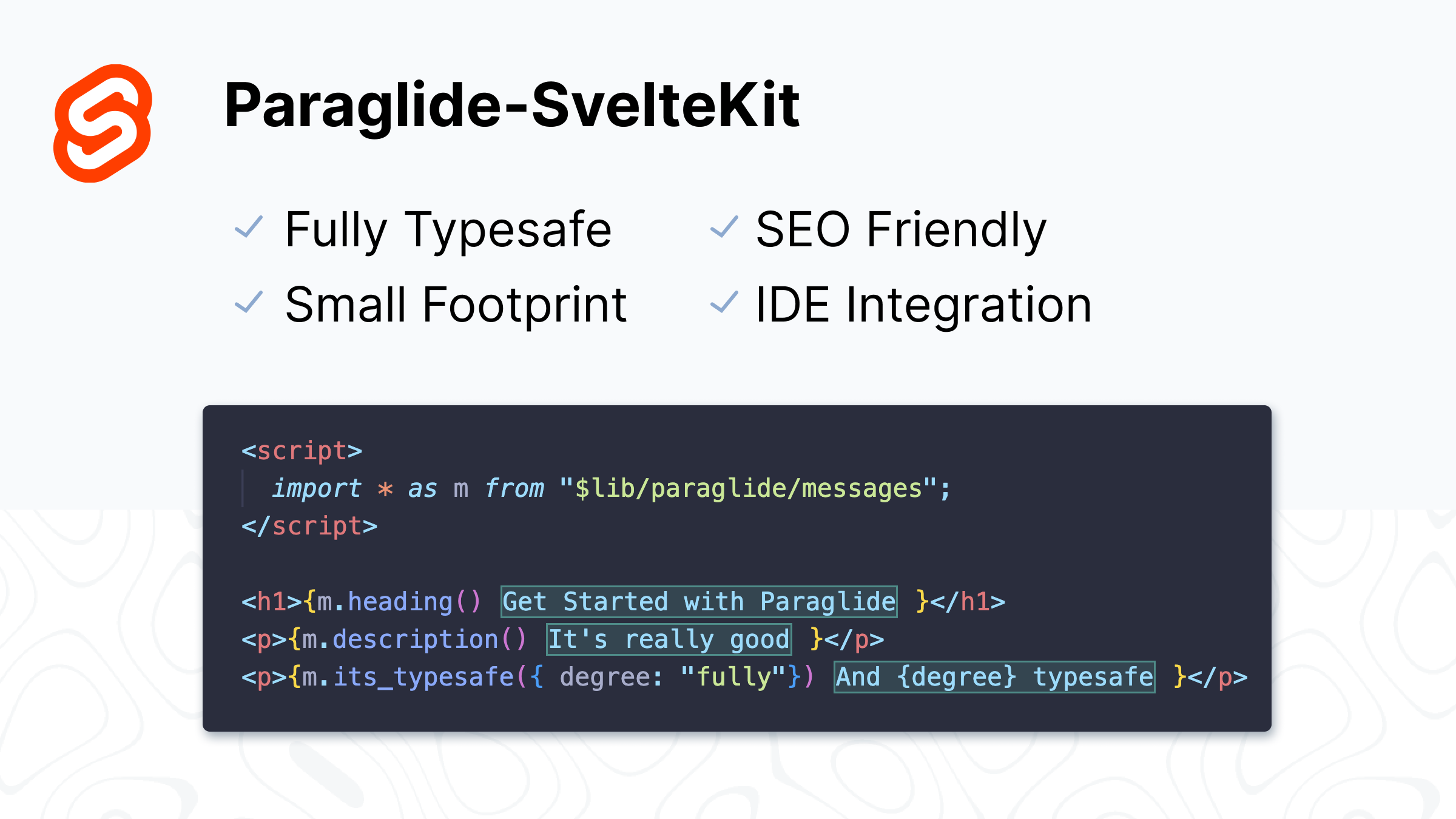imports:

This example shows how to use Paraglide with SvelteKit.The source code can be found here.
| Feature | Supported |
|---|---|
| CSR | ✅ |
| SSR | ✅ |
| SSG | ✅ |
| URLPattern | ✅ |
| Any Strategy | ✅ |
Getting started
Install paraglide js
npx @inlang/paraglide-js@latest init
Add the paraglideVitePlugin() to vite.config.js.
import { sveltekit } from '@sveltejs/kit/vite';
import { defineConfig } from 'vite';
+import { paraglideVitePlugin } from '@inlang/paraglide-js';
export default defineConfig({
plugins: [
sveltekit(),
+ paraglideVitePlugin({
+ project: './project.inlang',
+ outdir: './src/lib/paraglide',
+ strategy: ['url', 'cookie', 'baseLocale'],
+ })
]
});
Add %lang% to src/app.html.
See https://svelte.dev/docs/kit/accessibility#The-lang-attribute for more information.
<!doctype html>
-<html lang="en">
+<html lang="%lang%">
...
</html>
Add the paraglideMiddleware() to src/hooks.server.ts
import type { Handle } from '@sveltejs/kit';
import { paraglideMiddleware } from '$lib/paraglide/server';
// creating a handle to use the paraglide middleware
const paraglideHandle: Handle = ({ event, resolve }) =>
paraglideMiddleware(event.request, ({ request: localizedRequest, locale }) => {
event.request = localizedRequest;
return resolve(event, {
transformPageChunk: ({ html }) => {
return html.replace('%lang%', locale);
}
});
});
export const handle: Handle = paraglideHandle;
Add a reroute hook in src/hooks.ts
IMPORTANT: The reroute() function must be exported from the src/hooks.ts file, not src/hooks.server.ts.
import type { Reroute } from '@sveltejs/kit';
import { deLocalizeUrl } from '$lib/paraglide/runtime';
export const reroute: Reroute = (request) => {
return deLocalizeUrl(request.url).pathname;
};
Usage
See the basics documentation for more information on how to use Paraglide's messages, parameters, and locale management.
Static site generation (SSG)
Enable pre-renderering by adding the following line to routes/+layout.ts:
// routes/+layout.ts
+export const prerender = true;
Then add "invisble" anchor tags in routes/+layout.svelte to generate all pages during build time. SvelteKit crawls the anchor tags during the build and is, thereby, able to generate all pages statically.
<script>
import { page } from '$app/state';
+ import { locales, localizeHref } from '$lib/paraglide/runtime';
</script>
<slot></slot>
+<div style="display:none">
+ {#each locales as locale}
+ <a href={localizeHref(page.url.pathname, { locale })}>{locale}</a>
+ {/each}
+</div>
Troubleshooting
Disabling AsyncLocalStorage in serverless environments
If you're deploying to SvelteKit's Edge adapter like Vercel Edge or Cloudflare Pages, you can disable AsyncLocalStorage to avoid issues with Node.js dependencies not available in those environments:
export default defineConfig({
plugins: [
sveltekit(),
paraglideVitePlugin({
project: './project.inlang',
outdir: './src/lib/paraglide',
+ disableAsyncLocalStorage: true
})
]
});
No locale OR different locale when calling messages outside of .server.ts files
If you call messages on the server outside of load functions or hooks, you might run into issues with the locale not being set correctly. This can happen if you call messages outside of a request context.
// hello.ts
import { m } from './paraglide/messages.js';
// 💥 there is no url in this context to retrieve
// the locale from.
console.log(m.hello());